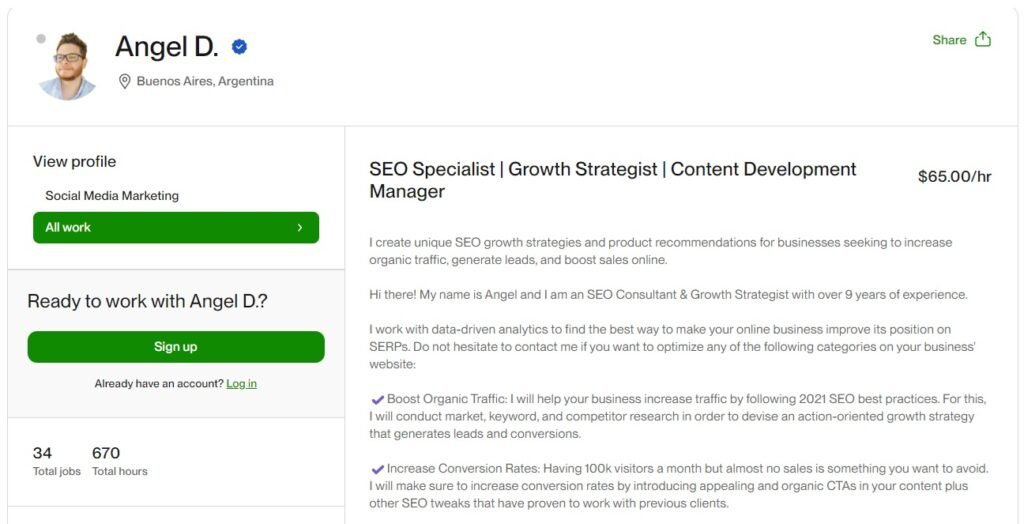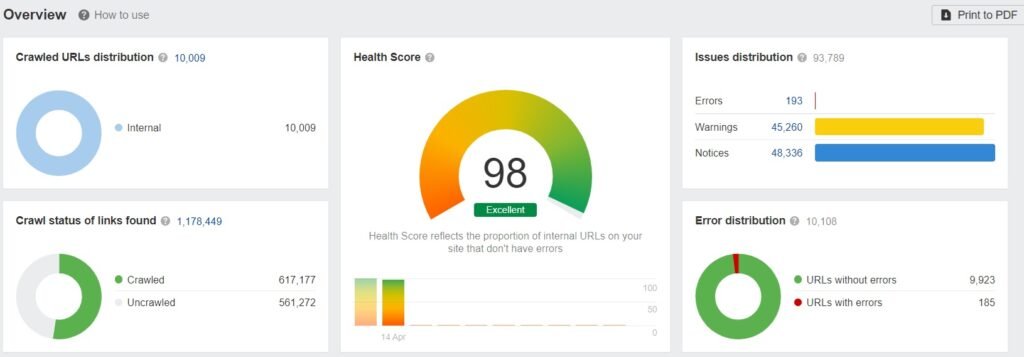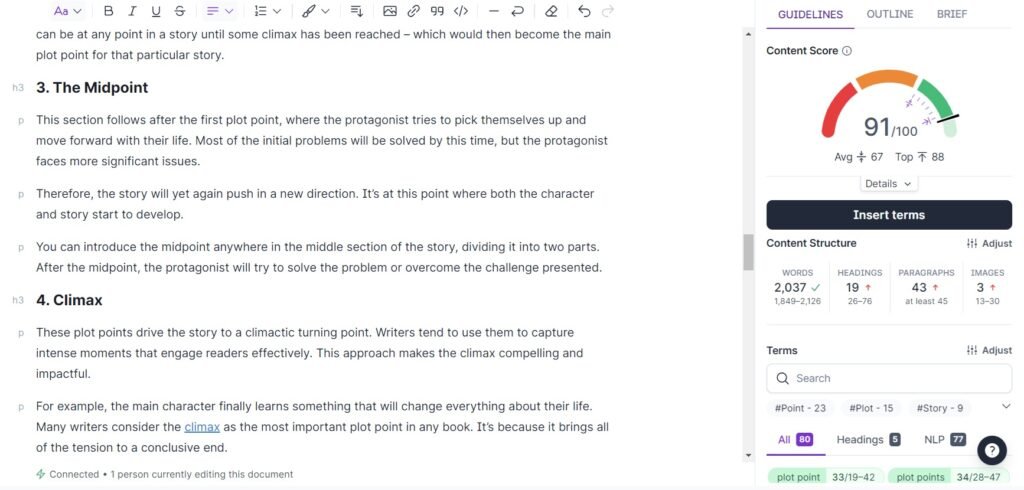How to Launch a Successful SEO Campaign in 5 Steps [July 2024]

Angel Diaz
In this post, you’ll learn the best way to create a data-driven SEO strategy. 15-minute read.

Starting an SEO campaign for your business website can seem tricky, but it’s essential for growth and online success. I’ll guide you through the process in this post while keeping things easy to understand.
Here’s what you’ll learn:
- The steps to plan and carry out your SEO campaign.
- Who you need on your team for a successful SEO campaign.
- How to organize and manage your team effectively.
- How to measure if your SEO is working (Crucial SEO Metrics).
- How much money to allocate for SEO.
- What you can expect from your SEO efforts.
- Why SEO matters for your business.
By the end of this post, you’ll be ready to launch your SEO campaign with confidence and boost your online business.
Let’s dive in.
What is an SEO Campaign?
An SEO campaign is simply the plan and actions you take to make a company grow in terms of organic sessions and conversions.
It’s divided into different stages, such as planning, execution, monitoring, and adjustment. It usually involves the skills of the following professionals to make it work.

Professionals:
- SEO lead
- Project managers
- Product managers
- Outreachers
- Content specialists
- Engineers
- Others
I’ve simplified the process I use when working with medium to large companies into 5 simple steps that you can use as a blueprint for your own SEO campaigns.
Steps to Launch an SEO Campaign?
Let’s take a look at the steps you can follow to launch an SEO campaign for your business.
Step 1: Assess Your Product
It’s essential to be familiar with your product before venturing into the SEO landscape. A skilled SEO strategist will take an interest in the product and its value before starting any SEO efforts..
Every product needs to be perfectly aligned with users’ intent, so you need to make sure that yours responds to what your potential customers are searching for.
To properly understand your product, an SEO specialist might request a product demo or even a sample of any physical product you intend to sell. This helps them grasp the user experience and how your target audience might interact with your product.
Step 2: Conduct Market Research
Market research is a process of gathering, analyzing, and interpreting information about a market, including information about the target audience, competitors, and the industry as a whole.
Here’s what you’ll get from it:
- Know what customers want: Find out the exact words and topics people search for.
- Better website content: Make your website more interesting and useful for visitors.
- Stay ahead of competitors: See what others are doing and do it better.
- Find the right keywords: Discover the ideal keyphrases so people can find you easily.
- Get more visitors: Attract more people to your site by matching their search needs.
- Spend wisely: Use your money on things that actually help bring more visitors.
- Make smart choices: Use your findings to make informed decisions that help your website succeed.
Doing market research is essential for businesses as it provides valuable insights into customer preferences, competitor strategies, and industry trends, enabling informed decision-making and strategic growth.
Step 3: Do Competitor Research
Analyzing your competitors’ online strategies allows you to understand their strengths and weaknesses in search engine rankings.

Here’s a list of what typically involves doing competitor research in SEO:
- Identifying your competitors
- Analyzing competitors’ websites
- Keyword analysis
- Content analysis
- Backlink analysis
- SEO strategy analysis
- Local SEO analysis
- SERP feature occupancy
- User experience and engagement
- Technical SEO audit
This process can help you identify opportunities for improvement and optimization in your own SEO efforts. Also, spotting chances to outperform them is key to making your website stand out.
Step 4: Run an SEO Audit
SEO audits provide a comprehensive evaluation of your website to pinpoint areas that need improvement for optimal SEO performance.

Using tools like Google Search Console, Ahrefs, or Lumar, along with manual research can be essential in uncovering technical issues and content opportunities.Key aspects to examine during an SEO audit include:
- Website structure: Is it easy for both users and search engines to understand?
- Page speed & mobile: Does the site load fast and work well on phones?
- Content quality: Is the content good and relevant to users?
- Keywords: Are the right words used in the content?
- Technical issues: Are there any problems that stop search engines from ranking the site?
- Backlinks: Do other websites link to yours, and are those links relevant?
- User engagement: Do people like the content and interact with it?
- Following SEO rules: Is the website following the right rules to do well on search engines?
An effective SEO audit outlines a clear plan for improving your website’s search engine visibility, user experience, and overall performance. Regular audits, whether monthly, quarterly, or annually, are essential to maintain and enhance your website’s SEO health.
Step 5: Create the Right SEO Strategy
A good strategy should include clear, measurable goals, serving as a roadmap, and aligning your SEO efforts with specific business objectives. The main benefits of a well-crafted SEO strategy include:
- Increased Organic Traffic: Targeting the right keywords and optimizing content boosts site visibility and visitor numbers through search engines.
- Enhanced User Experience: SEO improves website usability and engagement, encouraging repeat visits.
- Higher Conversion Rates: More relevant traffic leads to more conversions, turning visitors into customers.
- Improved Brand Trust: High search rankings boost your brand’s credibility and trustworthiness in your industry.
- Competitive Advantage: A strategic SEO approach helps you outperform competitors in search results.
- Cost-Effective Marketing: SEO offers lasting results, providing a more sustainable and cost-effective marketing solution compared to paid ads.
While it may take some time for the full impact of your SEO efforts to show, the long-term benefits are undeniable.
A well-executed SEO strategy lays the foundation for sustained growth, ensuring your business remains visible and competitive in the dynamic digital landscape.
How to Execute Your SEO Strategy
The execution of your SEO plan will naturally differ based on your industry and specific business objectives. However, common elements across most SEO strategies include:
1. Keyword Research
Dynamic keyword research identifies the words and phrases your target audience uses in search queries.

It’s crucial because it ensures your content aligns with the terms people are searching for, increasing the likelihood of your site appearing in relevant search results and attracting targeted traffic.
2. Meta Robots Optimization
This involves using meta tags to instruct search engine bots on how to crawl and index your web pages.

It is an important step because it allows you to control the visibility of your content, ensuring that search engines index your most relevant pages and exclude those that might negatively impact your SEO.
3. Image Optimization
This step ensures images on your site are using the right format, size, and descriptive alt text.

Image optimization is important because it enhances page load speed and user experience, both of which are critical for SEO. It also helps search engines understand and index your images, contributing to better visibility in search results.
4. Structured Data Optimization
Applying structured data markup to your content helps search engines understand the context and meaning of your pages.
This is vital for making your content show up better in search results. Doing it right can even get you featured snippets and knowledge graphs on Google SERPs, which can boost your click-through rates.
5. Landing Page Creation/Optimization
Making and fine-tuning your landing pages are crucial steps in SEO. You have to craft your content with the idea that people will find you through search engines like Google. The goal is to make everything super clear and engaging so visitors stick around instead of leaving quickly.
These pages are where most of your conversions will happen, so it’s essential to fill them with top-notch content that grabs users’ attention and leads them to take action.
6. Blog Creation and Optimization
Creating a blog for your business website or optimizing old blog posts is a solid strategy to attract more visitors and boost your site’s search ranking. The key is to produce content that’s not just engaging but also informative, helping people learn about what you offer.

It’s important to work on finding the right topics and creating catchy headlines that grab your audience’s attention.
Every blog post should be designed with your business goals in mind and speak directly to the interests of your target audience, ensuring that your blogging efforts contribute effectively to your overall strategy.
7. Outreach and Backlinks
This strategy involves connecting with other websites to get them to link back to your site. This process starts with creating great content that others will find valuable enough to share with their audiences. Then, you reach out to these potential partners, suggesting ways your content could be interesting or useful for their readers.
The aim is to build a relationship where they see the benefit in linking to your content. High-quality backlinks are like votes of confidence from other sites, showing search engines that your content is valuable and trustworthy, which can help improve your rankings and visibility online.
SEO Metrics: Data Collection and Analysis
For your SEO campaign to truly thrive, tracking and analyzing the right data is crucial. By keeping an eye on certain metrics regularly, you can fine-tune your strategy in real-time, ensuring your efforts are always aligned with your goals.

Essential metrics that SEO professionals monitor include:
- Keywords tracking
- Organic Backlink acquisition
- Site Authority
- Crawling and indexing errors
- Page speed
- Mobile friendliness
- Bounce rate
- CTR (Click-Through Rate)
- Conversion rate
- Funnel ruptures
- Avg. monthly traffic
- Competitors’ performance
- New vs. returning visitors
An SEO expert uses this data to make informed decisions, tweaking and optimizing the campaign as needed. It’s rare for an SEO strategy to be perfect from the start; ongoing adjustments are key to achieving the best outcomes.
The most effective campaigns are dynamic, continuously updated with fresh strategies informed by the latest data. This approach ensures they remain competitive and adapt to the constantly shifting trends of search engine algorithms.
How to Build Your SEO Team
Running an SEO campaign is a big job that touches many areas like creating content, building links, using social media, fixing website tech issues, and designing your website.
To make an SEO campaign work well, you need a team with different kinds of experts:
1. Growth Strategist
This person makes the big plan for the campaign. They look at all the data, figure out what needs to change, and come up with new ideas to help the company reach its goals.
You can always find the right SEO specialist on Upwork or freelance platforms if you wish to hire contractors instead of regular employees.
2. SEO Project Manager
This is the person who keeps the project on track every day. They make sure everyone knows what they’re supposed to do and checks off tasks as they’re completed. They’re crucial because they make sure the project meets its deadlines and achieves what it’s supposed to.
3. Design Team
This team focuses on creating a user-friendly and visually appealing website. They ensure the site is easy to navigate, mobile-responsive, and optimized for fast loading times, all of which contribute to a better user experience and higher search engine rankings.
4. Copywriters
Copywriters create compelling content that’s optimized for search engines and appeals to the target audience. Their work involves incorporating relevant keywords, crafting engaging headlines, and writing persuasive copy that encourages readers to take action, such as making a purchase or signing up for more information.
5. Content Writers
Content writers write articles and blog posts. They use specific keywords that make the website more visible in search results.
Their job is to create content that’s interesting and useful, answering readers’ questions or giving them new information. This way, more people find and visit the website, and if they like what they see, they might stay longer or come back again.
6. Outreach Specialists
They focus on promoting the website’s content by reaching out to other websites, bloggers, and influencers. Their main tasks involve building relationships, pitching content that could be of interest to these external parties, and securing backlinks or mentions.
These actions make the website more noticeable and trusted, helping it move up in search results and bring in more people because other sites recommend it.
7. Tech SEO Specialists
Tech specialists work on the backend, focusing on site architecture, improving page speed, ensuring mobile-friendliness, and setting up secure connections. Their work is vital because it helps search engines understand and index a website’s content more effectively.
By tackling technical challenges that might hinder a website’s performance, Tech SEO specialists play a crucial role in improving how users interact with the site and boosting its potential to higher in search rankings.
SEO Tools: The Best Options for an SEO Campaign
In an SEO campaign, leveraging the right tools is essential for effective team coordination, project management, and strategic execution.
These tools can be categorized based on their primary functions, such as communication, project management, keyword research, data analysis, and technical SEO analysis. Here’s a simple breakdown:
Communication
Project Management
Keyword Research
Data Analysis
Content Optimization/localization:
Technical SEO
How Much Does an SEO Campaign Cost?
The investment required for an SEO campaign can significantly differ based on several key factors, such as:
- The industry’s competitiveness
- Site authority
- Business goals
- Duration of the SEO campaign
That being said, I can tell you my experience with small, medium-sized, and big companies I’ve worked with.
I have created successful SEO campaigns for small companies with a total budget of 8k to 10k USD. Naturally, the goals were not too ambitious and the industry wasn’t quite competitive, not to mention the team was quite small (1 to 3 people).
I have also worked in successful SEO campaigns for medium-sized companies that allocate 100k to 300k USD for their SEO campaign. Here, the goals are bigger as well as the SEO team. Also, the campaign suration is usually longer.
Finally, If we go to the major league, I have been part of SEO campaigns for fortune 500 companies that can easily allocate millions of dollars for an SEO campaign. Of course, we are talking about complex projects with large teams and localized marketplaces across multiple countries. These campaigns usually happen in super-competitive industries with a massive ROI.
To provide further insight, let’s look at the the hourly rate for SEO on average in the US and overseas which can offer another perspective on budgeting for your campaign:
| Pricing model | Description | Avg. cost in the U.S | Avg. cost overseas |
|---|---|---|---|
| Hourly rate | Paying an SEO expert based on the time spent advising or executing tasks. | $75 - $100+/hr | $10 - $50+/hr |
Please note that the prices mentioned are approximate and can vary widely based on the specific service provider, the complexity of services, and market dynamics. It’s important to remember that the right investment in SEO not only depends on the size of your business but also on the scale of your goals and the competitive landscape of your industry.
Sources:
–Ahrefs.
–Outerbox Design
How Long Does SEO Take to Work?
The time period for SEO results to show varies widely based on factors like industry competitiveness, company size, budget, and market share. Generally, SEO improvements can start showing as early as 1 month, but it might take up to 12 months for more substantial outcomes.
It’s also worth noting that SEO is an ongoing process, with some campaigns extending beyond this period into continuous maintenance and gradual growth phases.
How important is SEO for Your Business?
SEO isn’t just another item on your business’s to-do list; it’s the backbone of your online presence. In a world where the majority of consumer journeys start with a search, being visible on search engines is non-negotiable. Here’s why:
- Increased Organic Traffic
- Improved User Experience
- Higher Conversion Rates
- Enhanced Credibility and Trust
- Competitive Advantage
- Cost-Effectiveness
In essence, SEO is crucial for your business’s growth and sustainability. It’s about ensuring that when potential customers are looking for what you offer, you’re not just visible, but a top choice. Embracing SEO today means setting your business up for success tomorrow.

